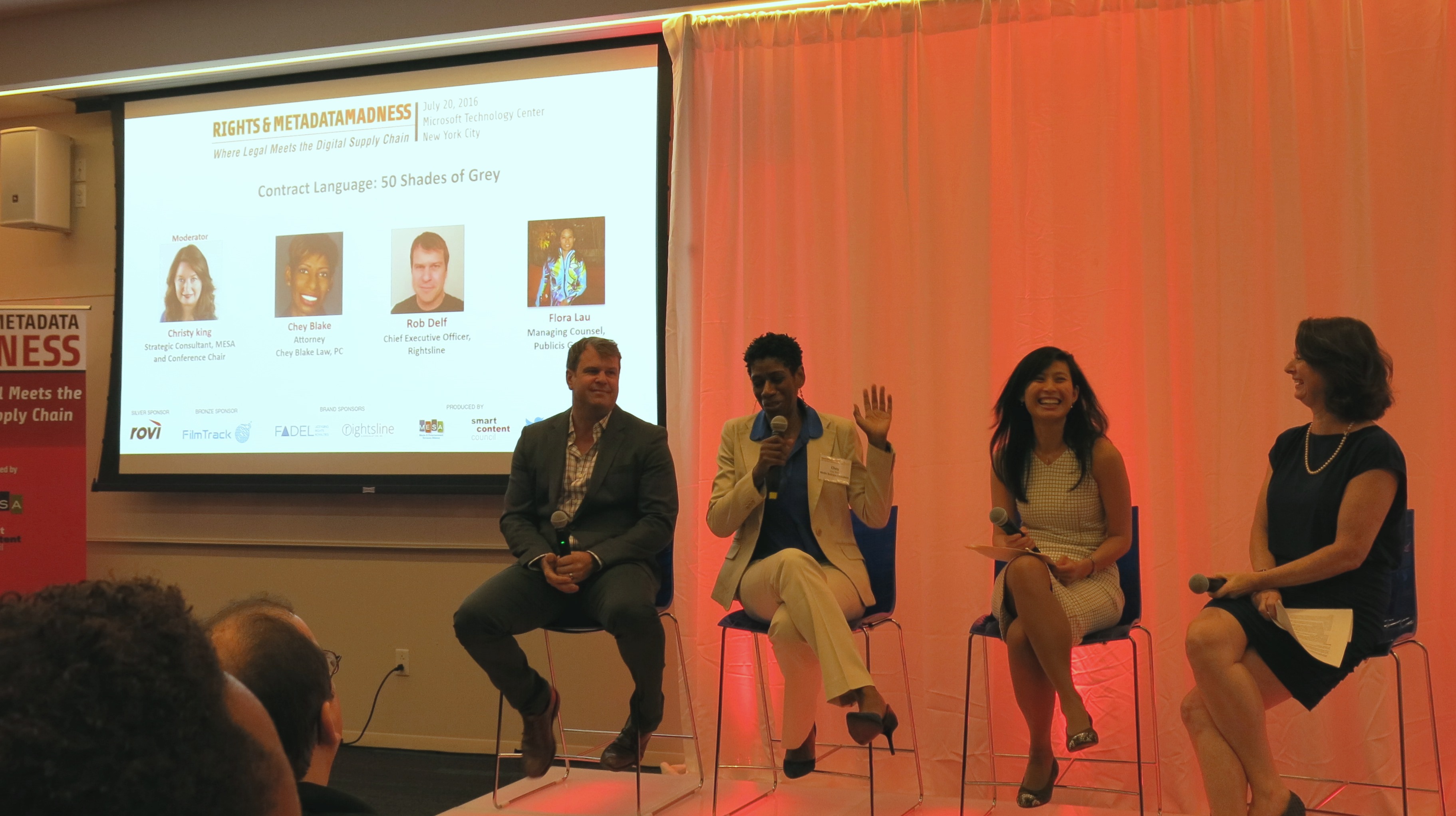M+E Daily

Attorney: Overly Broad Contract Language Can Be ‘Recipe for Disaster’
Story Highlights
NEW YORK — Contracts are a necessary part of licensing content and data, but contract language that is overly broad can be a “recipe for disaster,” according to Chey Blake, formerly of A&E Networks and now an attorney at Chey Blake Law, PC.
“All negotiations should be, in a sense, a win-win for both parties” when licensing content and “you really want to be clear where you are at the end of the day because otherwise you’re just going to fight about it” sooner or later, Blake said during a panel called “Contract Language: 50 Shades of Grey” at the Rights & Metadata Madness conference July 20.
“It can work against you to have grey language” in a contract in general, Blake said. When you are licensing content from another company, if the language used is too broad and there is somebody with “some savvy on the other side, then you’re not going to get your contract signed” anyway, she said. If the contract wording is too vague, “you open yourself up for challenge if it’s something they’re likely to challenge you on,” she said.
Therefore, “you want to be clear enough that you can defend it – that it’s not easily challengeable, but not so clear all the time that you’re restrictive,” she said.
Conversely, when you’re licensing out content to another party, “I will say that, yeah, I’m a lot more definitive and a lot more limited about what rights I’m giving” to another company, she said. The other party that is licensing the rights “can always come back and ask you for more [and] sometimes it’s in your better interest to allow them to have more rights if those rights are going to make you more money,” she said.

Clients of ad and public relations agency Publicis Groupe tend to want broad rights to use content they are licensing from another company, Flora Lau, its managing counsel, said.
But the company understands that a company licensing content may be restricted due to contracts already signed with other parties, so “we find a happy medium,” she said.
New technology has only made such contracts more complex, the panelists said. And that’s even more so when working with companies in other countries. Rights data tends to be handled differently based on the company and what country it’s based in, as well as what type of content it is.
“One of the challenges that everyone in this room is familiar with is the explosion of different business models and devices,” Rob Delf, CEO of rights management company Rightsline, said. “We’re doing projects internationally that are mobile phone-based, SVOD networks with download capabilities” and digital rights management is built in now, he said. “But then there’s also this problem” of the content companies want to display or offer on an SVOD basis spanning everything from short-form webisodes to music videos to feature-length Hollywood “blockbusters,” he said.
“We’re having to aggregate this tremendous amount of data around both what the type of content is and what the rights are,” he explained. “Because it’s so new and because we’re having to go to these places [all over the world], what we’re doing is we’re backing into it. We’re saying ‘OK, what is the thing going to look like to the consumer?’ ‘What are the deals that you’re doing with the studio?’ Because, normally, SVOD doesn’t mean download to device.”
However, everything doesn’t work according to tradition in every country, he said. In Africa, for example, he said, “there’s a very specific problem where Wi-Fi and cellular networks aren’t ubiquitous, so people go to spots, download content, go back home where they may not have connectivity and watch a movie and then it needs to expire in 48 hours, right? So not only are the contracts different, the rights are different.” Plus, you have to factor in the possible need for 16 different languages to be covered, he said.

“Then, to throw another complex deal on it, conservative countries, of which there are a number in sub-Saharan Africa” tend to be “very religious,” so if a company puts content on someone’s device there that’s rated R, that firm’s CEO can be put in jail, he said.
As a result, he explained: “We have to make sure that when we capture that stuff up front, we’re saying ‘OK, hold on a second, this is absolutely restricted from this country, this country, this country – these cellular networks.”
In other words, as moderator Christy King, MESA strategic consultant and conference chair, pointed out, you can go to jail in some places if your metadata isn’t good enough.
Also on the agenda were the consequences of not being able to get the answer to a legal question quickly enough.
For one thing, it can increase a company’s liability, Blake said, adding: “Depending on how proactive your business people are, they will sometimes go off and sign a contract” before getting a legal answer “because they can’t wait and it’s time sensitive,” she said, adding: “Or they just won’t come to you because it’s going to take too long. So, if you can’t provide legal answers quickly people are going to stop asking because then you become what some people – not people I work with – would call the BPU, Business Prevention Unit.”









